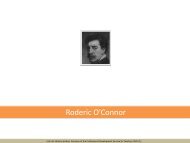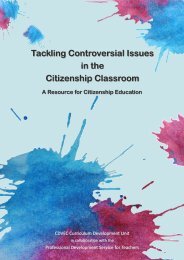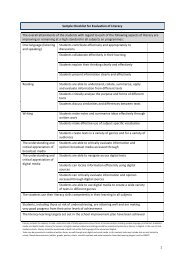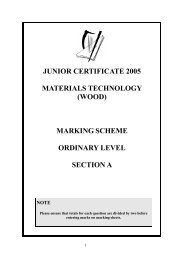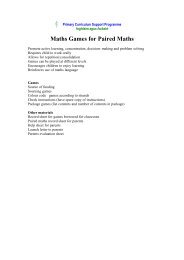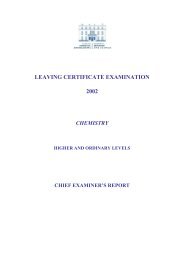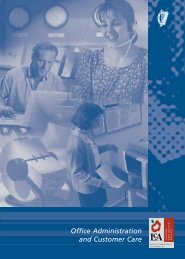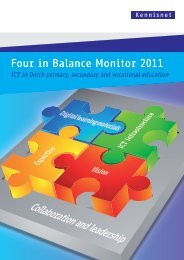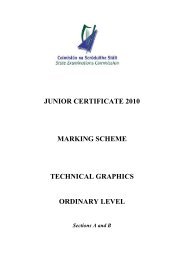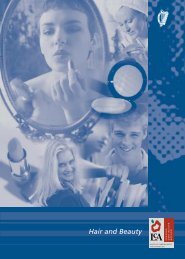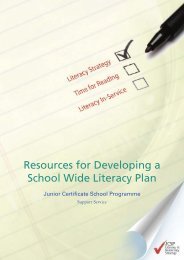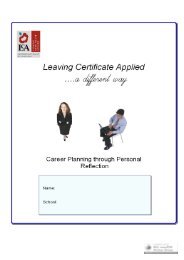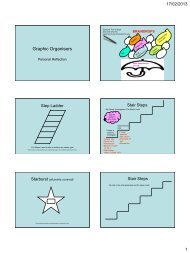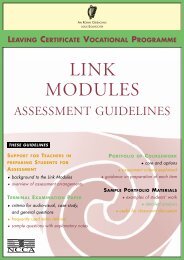GUIDELINES FOR TEACHERS - Curriculum Online
GUIDELINES FOR TEACHERS - Curriculum Online
GUIDELINES FOR TEACHERS - Curriculum Online
Create successful ePaper yourself
Turn your PDF publications into a flip-book with our unique Google optimized e-Paper software.
PHYSICS<br />
Fig. 2.1 Physics and the everyday world<br />
Medicine<br />
X-rays, ultrasound,<br />
thermometers<br />
Metereology<br />
measurement<br />
weather forecasting<br />
Energy<br />
sources of energy<br />
Information and Communication<br />
Technologies<br />
Computer, telephone,<br />
television, optical fibres<br />
Leisure<br />
cameras, tapes, CDs<br />
PHYSICS<br />
Engineering and Technology<br />
structures, machines, electronics<br />
Transport<br />
cars, bicycles,<br />
new modes of transport<br />
Archaeology<br />
techniques for investigation,<br />
e.g. radiocarbon dating, soil resistivity<br />
Arts<br />
theatre, opera,<br />
visual arts<br />
Space Physics<br />
telescopes, spectroscopes,<br />
rockets, satellites<br />
At home<br />
electricity, keeping warm,<br />
appliances<br />
Physics contributes to a student’s future career in many<br />
ways. It helps, in conjunction with the other Leaving<br />
Certificate subjects, to provide a broad, balanced education<br />
for any student. Physics teaches students to think logically<br />
and enables them to express their thoughts in a concise<br />
manner. The skills and knowledge developed through their<br />
study of physics can be useful in a wide<br />
variety of situations.<br />
Physics is a useful subject for many courses and careers<br />
and a good foundation for a broad range of scientific<br />
and technical careers. Many careers benefit from the logical<br />
and numeracy skills developed by the study of physics.<br />
Many technical courses involve components of physics.<br />
2.4 PHYSICS AND CAREERS<br />
Students may move into employment or into further<br />
study following their two years of physics. They may<br />
choose a post Leaving Certificate course (PLC) or move<br />
on into third level. Physics and physics-related courses<br />
may be taken at certificate, diploma and degree level in<br />
third-level institutions.<br />
For students who are interested in proceeding further<br />
with physics, the Institute of Physics provides<br />
information on the range of careers that students can<br />
follow after their study of physics at third level (see<br />
section 7.9).<br />
2.5 PHYSICS AND THE SENIOR CYCLE CURRICULUM<br />
Physics helps students understand the world in which<br />
they live. The concepts of physics explain many of the<br />
wonders of our everyday lives. It is the role of physics in the<br />
general education of Leaving Certificate students that is<br />
emphasised in the syllabus and is supported, in particular,<br />
by the science, technology and society component of the<br />
syllabus. A further aim is to help them develop the ability to<br />
understand certain social issues that they, as citizens, may<br />
encourage in their lives. The syllabus also introduces<br />
students to the world of physics and aims to interest them in<br />
proceeding with further studies in physics or the technical<br />
areas of engineering, which can be considered as applied<br />
physics. Physics contributes in an important way to<br />
providing students with a broad general education, as well<br />
as preparing them for further education.<br />
9



